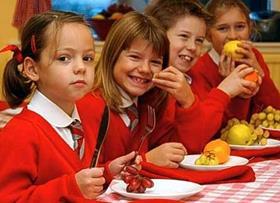
Immediate family members outstrip celebrities as children’s healthy living role models, new research from the British Nutrition Foundation (BNF) has shown.
Released as part of BNF Healthy Eating Week 2016, the data surveyed 14,399 children aged 7-16 years old, and found that children look to close family members to set an example for healthy living, despite being surrounded by images of celebrities and celebrity culture.
Nearly a third (31 per cent) of children asked cited family members as their healthy eating role models, while a quarter (23 per cent) said that family members are their role models for being active, second to sports people (26 per cent).
Celebrities rank further down both the healthy eating and exercise role model lists, chosen by 11 per cent and nine per cent of the children, respectively.
Role models change with age, the research found, as although 37 per cent of 7-10 year olds rated family as their role models for healthy eating, this dropped to 23 per cent among 14-16 year olds. Similarly, 14-16 year olds were three times as likely to look up to celebrities than those in the younger age group.
Other findings included that over three quarters of all children said they have access, and can help themselves, to fresh fruit and vegetables at home, while only four per cent said that they can never help themselves.
BNF managing director, Roy Ballam, said: “We are able to see from the children’s point of view the influence that close family members and friends can have on their attitudes and behaviour in relation to food and exercise, as well as the positive impact that strategies for changing behaviour can have in their lives.
“While models for good practice can be set out, and the science and application of food and nutrition learned in the classroom, children told us that they look to those close to them at home to help them implement positive changes in their lives.”
Weight was the strongest motivator for wanting to eat healthily among the children surveyed, followed by a desire to be sporty, feeling good, having nicer skin, and having more energy.
Ballam continued: “These research findings indicate that family role models are important in helping young people to make good choices related to food and physical activity and in supporting them in remaining motivated to achieve their targets.
“But it also shows that children have negative feelings and perceptions associated with healthy living which need to be countered – 14 per cent of children say that the thing that stops them from eating healthily or being more active is that 'I find it boring' or 'I don’t have time' and 13 per cent say 'I can’t be bothered'.'



